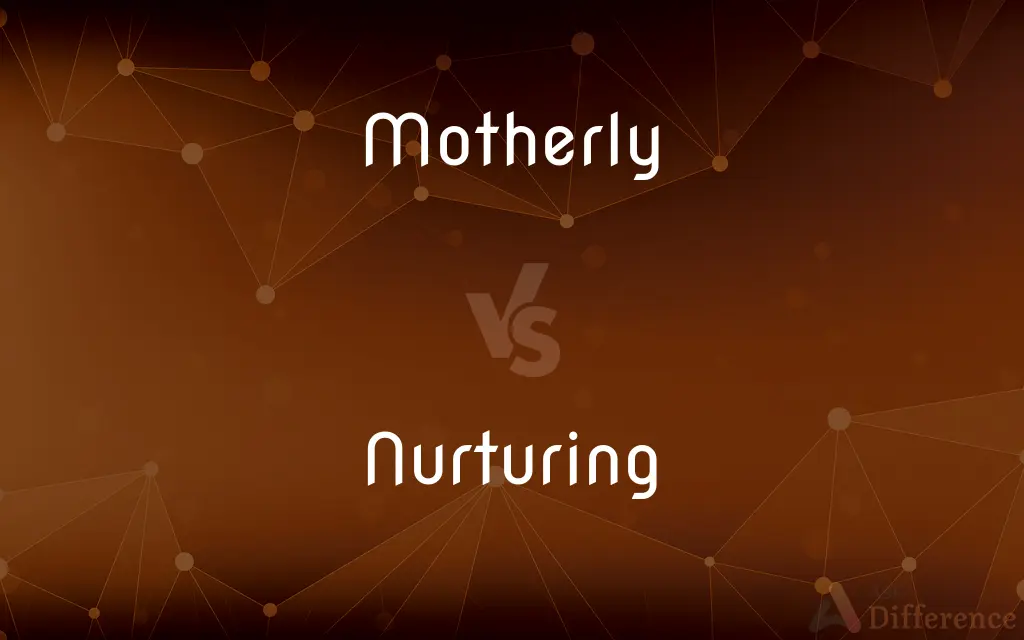Motherly vs. Nurturing — What's the Difference?
By Tayyaba Rehman — Published on October 4, 2023
"Motherly" denotes exhibiting characteristics typically associated with a mother, such as affection and care, while "nurturing" refers to the act of caring for and encouraging growth or development.

Difference Between Motherly and Nurturing
Table of Contents
ADVERTISEMENT
Key Differences
"Motherly" and "nurturing" share common ground in expressions of care, affection, and support, but they differ subtly in their connotations and applications. "Motherly" specifically evokes qualities traditionally attributed to mothers, like warmth, protection, and kindness, implying a maternal, caring nature. It’s often associated with a gentle, loving demeanor and protective instinct, reflecting qualities observed or expected in mothers. "Nurturing," on the other hand, is a more generalized term referring to the provision of care, support, and encouragement to facilitate growth or development, applicable to various relationships and contexts, not strictly maternal.
"Motherly" emphasizes a demeanor or approach that is tender, protective, and comforting, indicative of a mother’s love and care. It tends to imply a specific kind of affection and concern associated with maternal figures, reflecting a comforting and reassuring presence. "Nurturing," conversely, places emphasis on actions and processes conducive to growth and well-being, such as providing nourishment, support, and encouragement. It denotes a fostering, cultivating approach, focusing on the development and well-being of the nurtured subject, without being inherently maternal.
While "motherly" is predominantly an adjective, describing behaviors, attitudes, or appearances reminiscent of a mother, "nurturing" serves primarily as a verb or adjective, depicting the act or quality of fostering growth, development, or well-being. "Motherly" conveys a specific type of caring, usually gentle and loving, related to maternal instincts. "Nurturing," in its versatile usage, conveys the facilitation of growth and development through care and encouragement, extending beyond maternal contexts to any relationship or environment promoting growth and well-being.
"Motherly" may often evoke a sense of security and unconditional love, resonant with the perceived role of mothers in providing solace and protection. It connotes a specific, culturally informed idea of maternal love and care, often associated with warmth, gentleness, and selflessness. "Nurturing," while encompassing care and encouragement, is more about the enabling and fostering of growth and development, contributing to the well-being and advancement of the nurtured, and is not exclusive to maternal relationships.
Comparison Chart
Definition
Exhibiting qualities attributed to mothers
Caring for and encouraging growth or development
ADVERTISEMENT
Focus
Maternal demeanor and care
Facilitation of growth and well-being
Application
Specific to maternal or mother-like qualities
General, extends to any fostering relationship or context
Grammatical Usage
Predominantly adjective
Verb or adjective, based on context
Connotation
Implies tenderness, protection, and unconditional love
Implies fostering, encouragement, and support
Compare with Definitions
Motherly
Motherly means showing kindness and care typical of a good mother.
She bestowed a motherly hug upon the tearful child.
Nurturing
Nurturing involves providing care and encouragement for the development of someone or something.
Her nurturing approach helped the shy child blossom into a confident individual.
Motherly
Motherly refers to portraying a warm, gentle, and caring demeanor characteristic of mothers.
Her motherly demeanor made everyone around her feel nurtured and understood.
Nurturing
Nurturing implies supporting, caring for, and promoting the growth or development of someone or something.
Nurturing relationships play a pivotal role in individual well-being and development.
Motherly
Motherly implies providing comfort and protection like a mother.
She gave a motherly smile that made him feel safe and loved.
Nurturing
Nurturing refers to cultivating and encouraging growth, development, or well-being.
His nurturing guidance allowed the team to overcome many obstacles and succeed.
Motherly
Motherly describes having a loving and nurturing nature akin to a mother.
The teacher's motherly concern for her students was visible in her actions.
Nurturing
Nurturing denotes fostering growth, development, or well-being.
The nurturing environment at the school facilitates student development and learning.
Motherly
Motherly denotes exhibiting concern and affection like that of a mother.
Her motherly instincts were evident when she comforted the crying baby.
Nurturing
Nurturing means aiding, fostering, and facilitating growth or development through care and support.
The nurturing teacher helped the students realize their full potential.
Motherly
Of, like, or appropriate to a mother
Motherly love.
Nurturing
The action of raising or caring for offspring
The nurture of an infant.
Motherly
Showing the affection of a mother.
Nurturing
(Biology) The sum of environmental influences and conditions acting on an organism, especially in contrast to heredity.
Motherly
In a manner befitting a mother.
Nurturing
The fostering or overseeing of the development of something
The nurture of an idea.
Motherly
Befitting a mother; warm, caring, nurturing, protective, loving.
Nurturing
Something that nourishes; sustenance
"The butterfly poked its tiny proboscis down into her hair, probing for nurture" (Barbara Kingsolver).
Motherly
In a way pertaining to, befitting, or of a mother.
Nurturing
To raise or educate (a child, for example).
Motherly
Of or pertaining to a mother; like, or suitable for, a mother; tender; maternal; as, motherly authority, love, or care.
Nurturing
To encourage or help develop; cultivate
"a small college town that had nurtured his intellectual and creative pursuits" (James S. Hirsch).
Motherly
In a manner of a mother.
Nurturing
To provide sustenance for; nourish
The meadow that nurtures the cattle.
Motherly
Befitting a mother; warm and nurturing
Nurturing
Present participle of nurture
Motherly
In a maternal manner; as a mother;
She loved her students almost maternally
Common Curiosities
Does "motherly" always imply a biological relationship?
No, "motherly" can describe anyone exhibiting the caring, protective qualities typically attributed to mothers, regardless of biological relation.
Can "motherly" imply unconditional love and protection?
Yes, "motherly" often implies a level of unconditional love, care, and protection akin to what is expected from mothers.
What does "motherly" specifically refer to?
"Motherly" specifically refers to exhibiting qualities and behaviors typically associated with a mother, such as care and affection.
Can "nurturing" extend beyond human relationships?
Yes, "nurturing" can extend to any context where care, support, and encouragement are provided to foster growth or well-being.
Is "nurturing" exclusive to maternal care?
No, "nurturing" is a versatile term not exclusive to maternal care; it can describe any act of fostering growth or development through care and encouragement.
Can "nurturing" relate to both physical and emotional development?
Absolutely, "nurturing" can relate to the facilitation of physical, emotional, intellectual, or social development.
Share Your Discovery

Previous Comparison
Butt vs. Derriere
Next Comparison
Complaisance vs. MilitantnessAuthor Spotlight
Written by
Tayyaba RehmanTayyaba Rehman is a distinguished writer, currently serving as a primary contributor to askdifference.com. As a researcher in semantics and etymology, Tayyaba's passion for the complexity of languages and their distinctions has found a perfect home on the platform. Tayyaba delves into the intricacies of language, distinguishing between commonly confused words and phrases, thereby providing clarity for readers worldwide.
















































